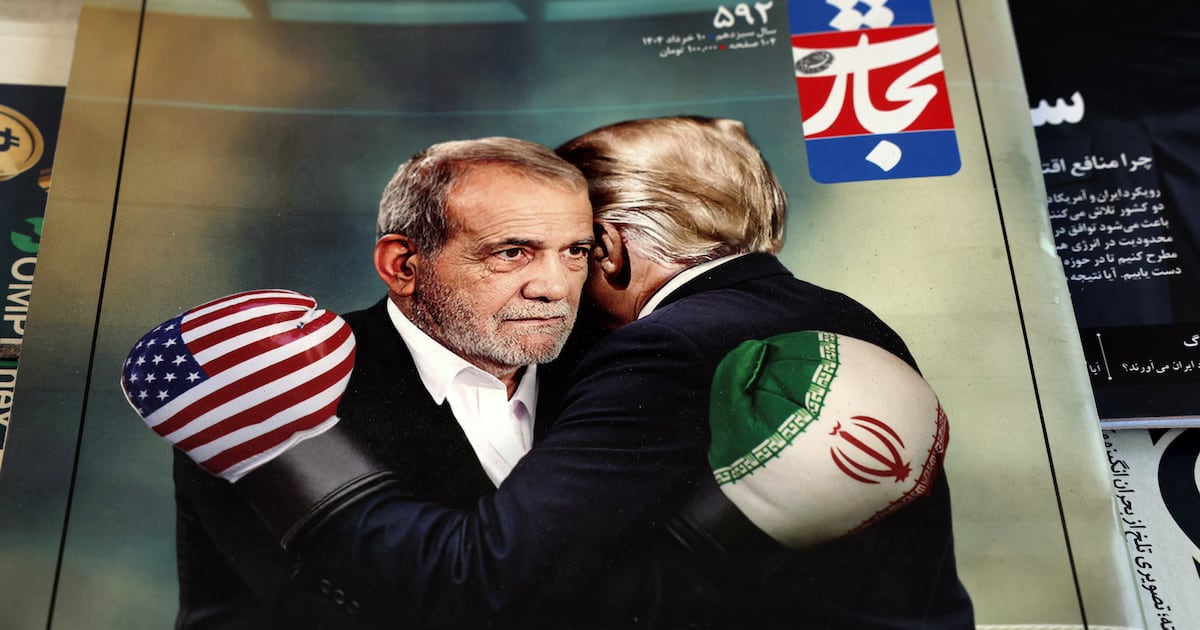Iran will keep on talking to the UN’s nuclear watchdog, the country’s deputy foreign minister said after the first visit by the agency since Tehran suspended its co-operation.
On Monday, as President Masoud Pezeshkian faced criticism for pushing for negotiations with the International Atomic Energy Agency (IAEA), its deputy head arrived in Tehran for the first visit since Iran ended interaction last month.
Iranian Foreign Minister Abbas Araghchi said no inspections were planned. His deputy Kazem Gharibabadi told Irna news agency that IAEA deputy director general Massimo Aparo had left Iran after meetings with an Iranian delegation, including officials from the Foreign Ministry. “The method of interaction between the agency and Iran” was discussed during the meeting, he said.
Mr Gharibabadi added that they had decided to continue consultations, without providing details or a timescale. There was no statement from the IAEA after the meeting.
Iran condemned the agency for refusing to criticise the US and Israeli attacks on its nuclear centres during the 12-day war in June. Such operations are an offence under the Geneva Conventions.
Tehran also said the IAEA had provided Israel with the pretext to start a war after a report accused Tehran of hiding enriched uranium. After the war ended, a bill was passed in Iran’s Parliament restricting Tehran’s co-operation with the IAEA.
Mr Gharibabadi said the Iranian delegation had reiterated its criticism of the agency for its “failure to fulfil its responsibilities” during the war. He said they had called on the IAEA to take a different approach when it comes to Iran’s nuclear capability.
The IAEA visit comes as Mr Pezeshkian defends his approach to diplomacy and negotiations after the war which derailed nuclear talks with the US. Iranian hardliners have opposed a return to talks with the US in the aftermath of American strikes on nuclear facilities.
Mr Pezeshkian has criticised domestic opponents of negotiations with the US, stressing that engaging in talks does not mean surrendering. He also challenged opponents to provide an alternative to negotiations.
The President also defended his actions, reiterating they were aligned with those of supreme leader Ayatollah Ali Khamenei. “If you do not talk, what do you want to do? Do you want to fight?” he asked during a meeting with media executives, according to Ettelaat newspaper.
The remarks sparked reactions from hardliners, who said he made Tehran look weak on the international stage. Tasnim News Agency, affiliated to the Islamic Revolutionary Guard Corps (IRGC), said he was projecting a “desperate image” of Iran.
“When we speak publicly as President, it is not only us who hear it, the enemy hears it,” the article said. “If we portray ourselves as weak and desperate, as if we have no choice but to talk, and if we don’t talk, the other side will come and beat us.”
“It is clear that when we say that we have no choice but to negotiate, the other side will be less likely to make concessions and will be more inclined to increase the tension,” hardline Farhikhtegan newspaper said.
Shahab Tabatabaei, a member of the Government Information Council, on Tuesday defended Mr Pezeshkian’s approach, saying he is the “same person who was firm and steadfast during the 12-day war”, according to Irna.
Despite the debate over dialogue, officials have repeatedly stated there were no plans for negotiations with the US or European powers.
Expert advice
“Join in with a group like Cycle Safe Dubai or TrainYAS, where you’ll meet like-minded people and always have support on hand.”
Stewart Howison, co-founder of Cycle Safe Dubai and owner of Revolution Cycles
“When you sweat a lot, you lose a lot of salt and other electrolytes from your body. If your electrolytes drop enough, you will be at risk of cramping. To prevent salt deficiency, simply add an electrolyte mix to your water.”
Cornelia Gloor, head of RAK Hospital’s Rehabilitation and Physiotherapy Centre
“Don’t make the mistake of thinking you can ride as fast or as far during the summer as you do in cooler weather. The heat will make you expend more energy to maintain a speed that might normally be comfortable, so pace yourself when riding during the hotter parts of the day.”
Chandrashekar Nandi, physiotherapist at Burjeel Hospital in Dubai
Six large-scale objects on show
Concrete wall and windows from the now demolished Robin Hood Gardens housing estate in Poplar
The 17th Century Agra Colonnade, from the bathhouse of the fort of Agra in India
A stagecloth for The Ballet Russes that is 10m high – the largest Picasso in the world
Frank Lloyd Wright’s 1930s Kaufmann Office
A full-scale Frankfurt Kitchen designed by Margarete Schütte-Lihotzky, which transformed kitchen design in the 20th century
Torrijos Palace dome
Killing of Qassem SuleimaniGreen ambitions
Trees: 1,500 to be planted, replacing 300 felled ones, with veteran oaks protected
Lake: Brown’s centrepiece to be cleaned of silt that makes it as shallow as 2.5cm
Biodiversity: Bat cave to be added and habitats designed for kingfishers and little grebes
Flood risk: Longer grass, deeper lake, restored ponds and absorbent paths all meant to siphon off water

